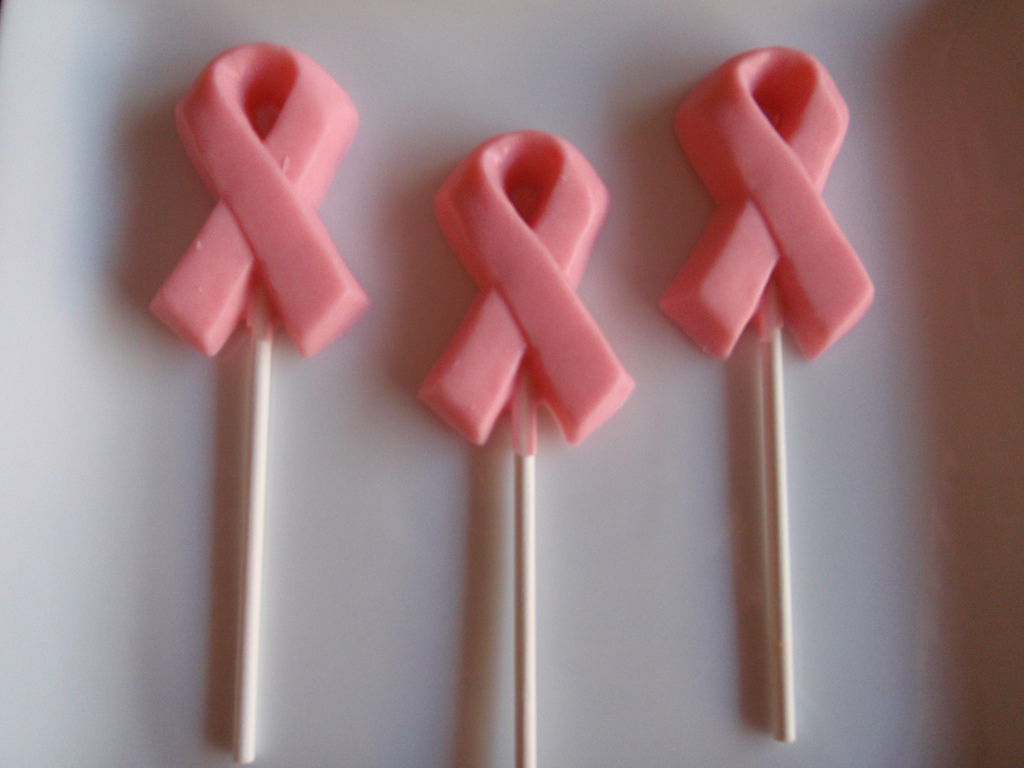By Christie Aschwanden | October 6, 2011 | 25 Comments

Here we go again. Another October, another flood of pink ribbons. Don?t get me wrong. I hate breast cancer. I want it gone. Three of my aunts have breast cancer, and the disease killed a dear friend of mine. So it pains me to see the science of breast cancer so often misreported by the media.
The problem starts with the basic narrative. As I wrote last year in Miller-McCune:
For years, women were taught the necessity of early detection for breast cancer based on the notion that breast cancer is a relentlessly progressive disease that will inevitably kill you if you don?t remove it in time. That story about breast cancer ? call it the ?relentless progression? mind model ? is easy to grasp, makes intuitive sense and offers a measure of comfort: Every cancer is curable as long as you catch it in time.
But it turns out that this mental model of breast cancer is wrong. Science has shown breast cancer to be far less uniform than the relentless progression model suggests, says H. Gilbert Welch of the Dartmouth Institute for Health Policy and Clinical Practice in Lebanon, N.H., and author of Should I Be Tested for Cancer? A more accurate description might be called the ?uncertain future? model. Instead of starting small and gradually growing and becoming more dangerous, cancers can behave in a variety of unpredictable ways.
As scientists have learned more about tumor biology, they?ve come to understand that it?s not size or time alone that determine a cancer?s lethalness. Instead, each individual cancer behaves in its own way, based on a variety of factors, including genetics and hormone receptors, that scientists are still trying to understand. In general, most breast cancers fall into one of three behavior categories. Some are so aggressive and fast spreading that our current treatments can?t alter their course. Others start out not so dangerous and then grow more aggressive with time (or the right environment), and the third type of breast cancer is slow to progress and essentially harmless.
We still can?t distinguish an aggressive one from a harmless one, except in retrospect. Some early stage cancers will come more aggressive and harmful with time, but others will never progress.
Yet that?s not the message you hear in so many of the news stories that proliferate like cancer each October. A large number of these stories promote the now-debunked relentless progression model, with a twist of self-empowerment thrown in. Their message ? all breast cancers will kill you, unless you?re vigilant enough about screening and catch that cancer ?early.? It?s up to you, ladies.
As Rachel C. notes over at author Gayle Sulik?s blog, Pink Ribbon Blues, magazine stories about breast cancer ?all seem to be good news stories; about how mammograms saved their lives, and how they?ve gone on to embrace the mantle of triumphant survivorship after so-called successful treatment.?
I?ve written about the limitations of mammography (and the mammography debate) elsewhere, but the bottom line is, mammography is an inefficient method for detecting breast cancer. It?s much better at finding the indolent cancers that would have never caused harm than it is at finding the nasty, aggressive ones most helped by treatment. Statistics show that for 2,000 women screened by mammography over 10 years, one will be prevented from dying of breast cancer and 10 others will receive treatments for a cancer that would have never become life-threatening. That means that screening causes 10 times as many women to become cancer patients unnecessarily as it prevents from dying from breast cancer.
Yet this message about the risks from mammography is often lost in the rush to save lives. Television stations, newspapers and magazines run stories about breast cancer survivors who are out urging women to get mammograms so that their lives can be saved too. Each woman is entitled to her opinion about whether a medical test helped her, but if her cancer was detected by a routine screening mammogram, then the statistics show that it?s more likely that the cancer never threatened her life in the first place. Her survival isn?t a miracle, it?s a given. The treatments she is so grateful for were unnecessary.
Welch calls this the overdiagnosis paradox. ?The more overdiagnosis the test causes, the more popular it is because there are more survivors,? he says. ?The person who had a breast cancer diagnosed by mammography? is tempted to view herself as being helped, but there are two other possibilities that are more likely,? he says. The first is that the person would have fared exactly the same without the mammogram, and the second is that the cancer the mammogram diagnosed was indolent and did not require treatment. ?I always hope that the person who found cancer via mammography was helped,? says Welch, but on an individual level it?s impossible to say which category an individual person falls into. Statistically, the vast majority fall into the overdiagnosed category.
But you won?t hear any of this in those stories with headlines like, ?Screening is what really counts for the cure.?
 I?m not anti-mammogram. But I believe that medicine should be based on science, not wishful thinking. Women who want mammograms should have access, but only after they?ve been fully informed of the risks as well as the benefits. If my experience interviewing oncologists and radiologists is any indication, most of these doctors don?t understand the risks. More often than not, when I interview a radiologist, breast oncologist or gynecologist they tell me that the only risk from a mammogram is a false alarm. I think it?s the job of journalists to challenge these false messages.
I?m not anti-mammogram. But I believe that medicine should be based on science, not wishful thinking. Women who want mammograms should have access, but only after they?ve been fully informed of the risks as well as the benefits. If my experience interviewing oncologists and radiologists is any indication, most of these doctors don?t understand the risks. More often than not, when I interview a radiologist, breast oncologist or gynecologist they tell me that the only risk from a mammogram is a false alarm. I think it?s the job of journalists to challenge these false messages.
Celebrity Wanda Sykes was recently diagnosed with ductal carcinoma in situ.? DCIS is a scary diagnosis.? Most cases of DCIS will never progress to invasive breast cancer, but some of them do, and there?s no way to tell yet if yours is the bad kind. If you?re the one with the diagnosis, you don?t want to be that statistic. Each woman must make her own treatment decisions, and she has every right to make choices that are in line with her values. Sykes chose a double mastectomy, and that?s her decision to make. But she did a terrible disservice to TV viewers when she told them, ?I had both breasts removed and because now I have zero chance of having breast cancer.?
This is simply not true, as Karen Kaplan reports in the Los Angeles Times . A prophylactic mastectomy reduces breast cancer risk by about 90 percent, which is not the same as eliminating it.
Which gets to the ugly, ugly truth that no one wants to talk about. There is no certainty with breast cancer. Once you have it, there is always a chance of recurrence. There is nothing a woman can do today ?not even cut off her breasts ? to completely eliminate her chance of dying of breast cancer. Despite the headlines in those women?s magazines, there are no foods that ?fight? breast cancer. Exercise, a healthy diet, limiting your alcohol consumption might reduce your risk, but only a little. Breast self-exams do not reduce breast cancer deaths, no matter how well you do them.
A woman does not get cancer because she did something wrong or wasn?t vigilant enough about screening. Nor does a woman survive breast cancer because she?s a ?fighter? or has a positive attitude. If she survives it, it?s because she was fortunate enough in her misfortune to get a type that responded to treatment.
Today, an estimated 150,000 Americans are living with metastatic breast cancer, but their stories are rarely the ones featured in the happy face articles. This October 13 is Metastatic Breast Cancer Awareness Day. I think it?s high time we gave these brave women (and men) their due.
?
***
Photos:
Lollipops: wishuponacupcake
Big pink ribbon by Jason Meredith
Comments
Source: http://www.lastwordonnothing.com/2011/10/06/breast-cancer%E2%80%99s-false-narrative/
chris cooley chris cooley stevan ridley breast cancer awareness month breast cancer awareness month when does ios 5 come out when does ios 5 come out
No comments:
Post a Comment
Note: Only a member of this blog may post a comment.